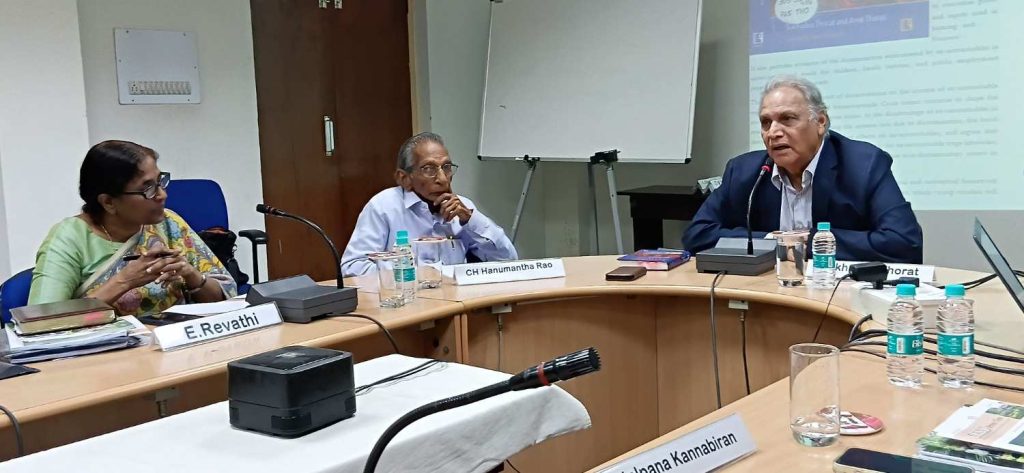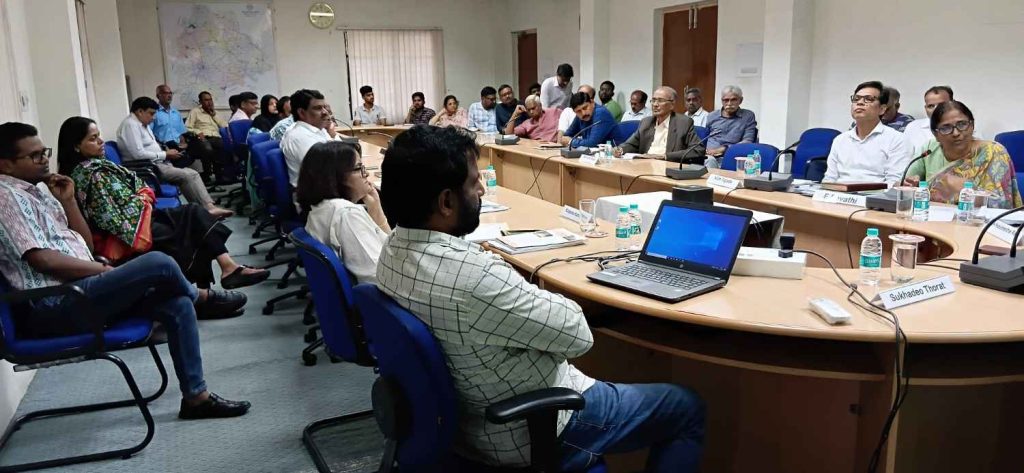

The Centre for Economic and Social Studies (CESS), Hyderabad, organised a Panel Discussion on the book “Economic Casteism” authored by Sukhadeo Thorat and Amit Thorat on Thursday, 16th October 2025, at CESS.
The session was chaired by Prof. C.H. Hanumantha Rao, Honorary Professor and Founder Member, CESS. Prof. E. Revathi, Director, CESS, introduced the book and spoke on the intersectionality of caste and class, emphasizing how both continue to influence economic and social outcomes.
The panel included distinguished scholars: Kalpana Kannabiran, Distinguished Professor, CSD, New Delhi, Nitin Tagade, Associate Professor of Economics, University of Hyderabad, S. Harinath, Research Associate, CESS, Vinod Mishra, Director, Indian Institute of Dalit Studies, New Delhi.
In his remarks, Prof. Sukhadeo Thorat presented the key findings of the book. He explained that “Economic Casteism” provides extensive empirical evidence on caste-based discrimination faced by ex-untouchables in the labour market as formal and non-formal labour, farmers and self-employed. The book also highlights the continuing influence of caste norms in shaping economic decisions within rural markets and their impact on the income levels of ex-untouchable wage labourers, farmers, and businesspeople. By estimating income losses caused by discrimination, the authors demonstrate its role in deepening poverty and emphasize the need for affirmative action across occupations to ensure equal access to markets and government services.
The study draws on evidence from rural markets—such as hiring, wages, sale and purchase of goods, and access to credit—to show how caste-based exclusion persists in economic and social life. Discriminatory practices extend to public schemes like the Midday Meal Programme and MGNREGA, and even in healthcare facilities. Economic discrimination remains deeply rooted, contributing to low income, limited employment opportunities, and higher poverty levels among Scheduled Castes.
While tracing the ideological and historical roots of caste-based exclusion, it was noted that prescriptions found in classical texts such as the Manusmriti have contributed to longstanding social and economic deprivations — including denial of rights to education, employment, and property. These textual and normative legacies continue to inform social practices that reproduce economic inequality.
While urbanization and technology have reduced visible forms of caste bias, subtle and structural discrimination continues to exist in markets and institutions. “Economic Casteism” also introduces a novel theoretical and conceptual framework for studying discrimination in markets and government institutions, serving as a valuable reference for researchers and young scholars.
The panelists explored the book in depth and reflected on its relevance to Dr. B.R. Ambedkar’s constitutional vision of equality and social justice. They discussed how discrimination persists even within the implementation of public welfare schemes, highlighting the importance of addressing these inequities as constitutional violations.
Prof. C.H. Hanumantha Rao emphasized given the caste discrimination, there is a need for further studies on the changes in the forms and processes of discrimination occurring in the society, and its outcomes in the past 10–15 years and what policy measures need to be undertaken to address the issues. The importance of continued research by scholars in this direction was emphasized.
